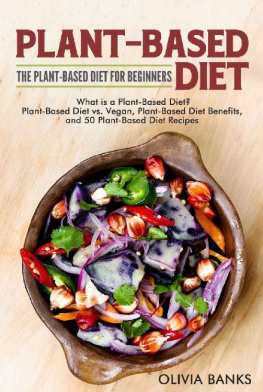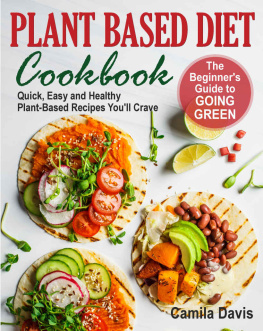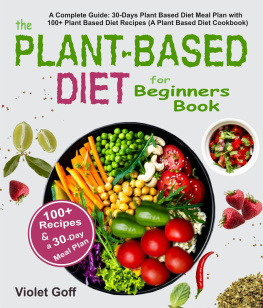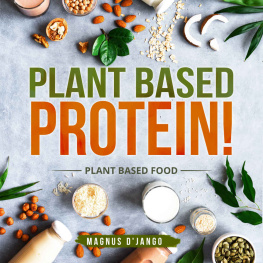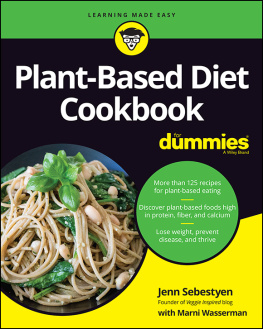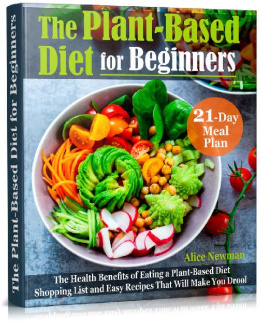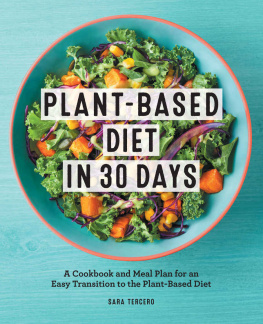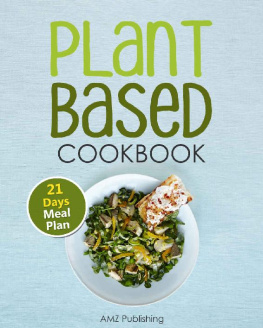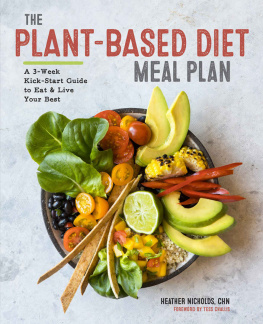It is only until recently that more and more people are starting to embrace the plant-based diet lifestyle. As to what exactly has drawn tens of millions of people into this lifestyle is debatable. However, there is growing evidence demonstrating that following a primarily plant-based diet lifestyle leads to better weight control and general health, free of many chronic diseases. This book will take you through the basics of this lifestyle, its benefits and why it works, as well as give ideas on how you can revamp your pantry and start whipping up delectable plant-based dishes. Whether you are new to this lifestyle or familiar with it, this book is definitely a treasure. Enjoy!
Chapter 1: The Basics of a Plant-Based Diet
What Is A Plant-Based Diet?
A lot of people are doing it; a lot of people are talking about it, but there is still a lot of confusion about what a whole food plant-based diet really means. Because we break food into its macronutrients: carbohydrates, proteins, and fats; most of us get confused about how to eat. What if we could put back together those macronutrients again so that you can free your mind of confusion and stress? Simplicity is the key here.
Whole foods are unprocessed foods that come from the earth. Now, we do eat some minimally processed foods on a whole foods plant-based diet such as whole bread, whole wheat pasta, tofu, non-dairy milk and some nuts and seed butter. All these are fine as long as they are minimally processed. So, here are the different categories:
Whole grains
Legumes (basically lentils and beans)
Fruits and vegetables
Nuts and seeds (including nut butter)
Herbs and spices
All the above-mentioned categories make up a whole foods plant-based diet. Where the fun comes in is in how you prepare them; how you season and cook them; and how you mix and match to give them great flavor and variety in your meals. There are chapters in this book dedicated to plant-based recipes which can give you an idea of what you can whip up real quick in your kitchen or those special meals you can prepare for the family. As long as you are eating foods like these on a regular basis, you can forget about carbs, protein and fat forever.
Now, some people might say, well, I cant eat soy or I dont like tofu and so on. Well, the beauty of a whole food plant based diet is that if you dont like a certain food, like in this case, soy, then you dont have to consume it. It is not a necessary component in a whole food plant-based diet. You can have brown rice instead of oats, quinoa instead of wheat; Im sure you catch the drift now. It doesnt really matter. Just find something that suits you.
Just because you have made the decision to adopt a plant-based diet lifestyle, doesnt mean that is a healthy diet. Plant-based diets have their fair share of junk and other unhealthy eats; case and point, regular consumption of veggie pizzas and non-dairy ice cream. Staying healthy requires you to eat healthy foods even within a plant-based diet setting.
Why You Need to Cut Back On Processed and Animal-Based Products
Youve probably heard time and time again that processed food is bad for you. Avoid preservatives; avoid processed foods; however, no one ever really gives you any real or solid information on why you should avoid them and why they are dangerous. So lets break it down so that you can fully understand why you should avoid these culprits.
They have huge addictive properties
As humans, we really have a strong tendency to be addicted to certain foods, but the fact is that its not entirely our fault.
Practically all of the unhealthy eats we indulge in, from time to time, activate our brains dopamine neurotransmitter. This makes the brain feel good but only for a short period of time. This also creates an addiction tendency; that is why someone will always find themselves going back for another candy bar even though they dont really need it. You can avoid all this by removing that stimulus altogether.
They are loaded sugar and high fructose corn syrup
Processed and animal-based products are loaded with sugars and high fructose corn syrup which have close to zero nutritional value. More and more studies are now proving what a lot of people suspected all along; that genetically modified foods cause gut inflammation which in turn makes it harder for the body to absorb essential nutrients. The downside of your body failing to properly absorb essential nutrients, from muscle loss and brain fog to fat gain, cannot be stressed enough.
They are loaded with refined carbohydrates
Processed foods and animal-based products are loaded with refined carbs. Yes, it is a fact that your body needs carbs to provide energy to run body functions. However, refining carbs eliminates the essential nutrients; in the way that refining whole grains eliminates the whole grain component. What you are left with after refining is whats referred to as empty carbs. These can have a negative impact on your metabolism by spiking your blood sugar and insulin levels.
They are loaded with artificial ingredients
When your body is consuming artificial ingredients, it treats them as a foreign object. They essentially become an invader. Your body isnt used to recognizing things like sucralose or these artificial sweeteners. So, your body does what it does best. It triggers an immune response which lowers your resistance making you vulnerable to diseases. The focus and energy spent by your body in protecting your immune system could otherwise be diverted elsewhere.
They contain components that cause a hyper reward sense in your body
What this means is that they contain components like monosodium glutamate (MSG), components of high fructose corn syrup and certain dyes that can actually carve addictive properties. They stimulate your body to get a reward out of it. MSG, for instance, is in a lot of pre-packaged pastries. What this does is that it stimulates your taste buds to enjoy the taste. It becomes psychological just by the way your brain communicates with your taste buds.
This reward-based system makes your body want more and more of it putting you at a serious risk of caloric overconsumption.
What about animal protein? Often times the term low quality is thrown around to refer to plant proteins since they tend to have lower amounts of essential amino acids compared to animal protein. What most people do not realize is that more essential amino acids can be quite damaging to your health. So, lets quickly explain how.
Animal Protein Lacks Fiber
In their quest to load up on more animal protein most people end up displacing the plant protein that they already had. This is bad because unlike plant protein, animal protein often lacks in fiber, antioxidants, and phytonutrients. Fiber deficiency is quite common across different communities and societies in the world. In the USA, for instance, according to the Institute of Medicine, the average adult consumes just about 15 grams of fiber per day against the recommended 38 grams. Lack of adequate dietary fiber intake is associated with an increased risk of colon and breast cancers, as well as Crohns disease, heart disease, and constipation.

